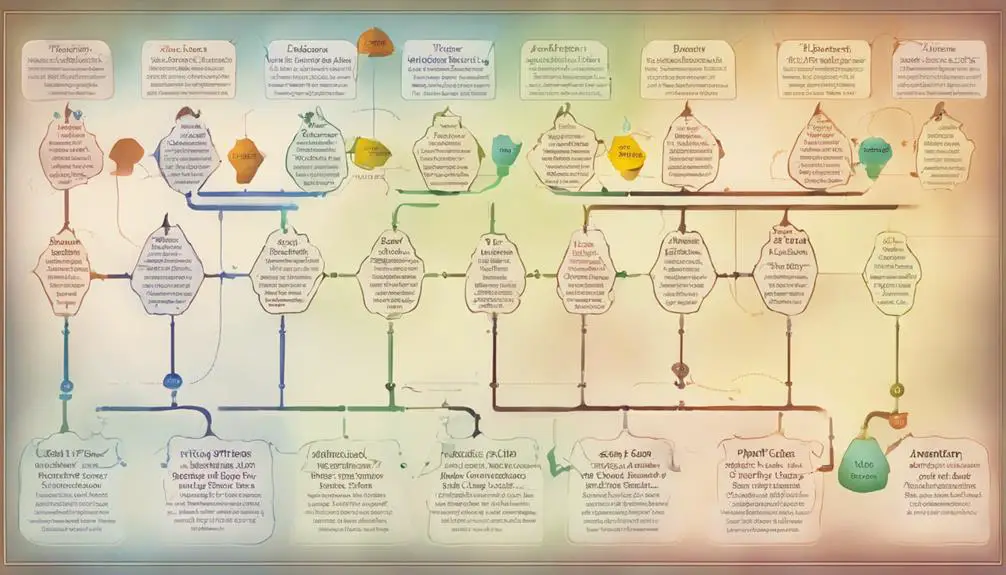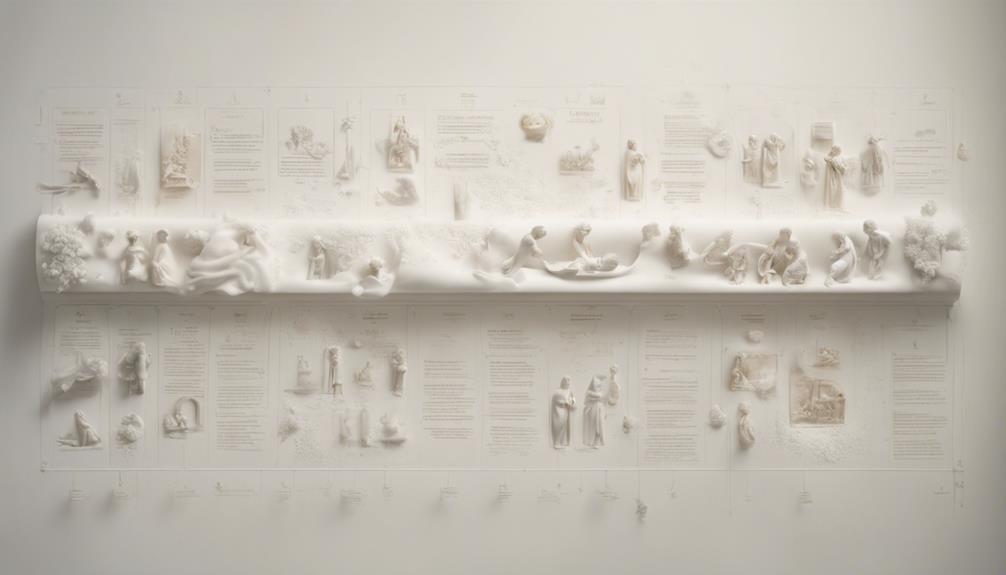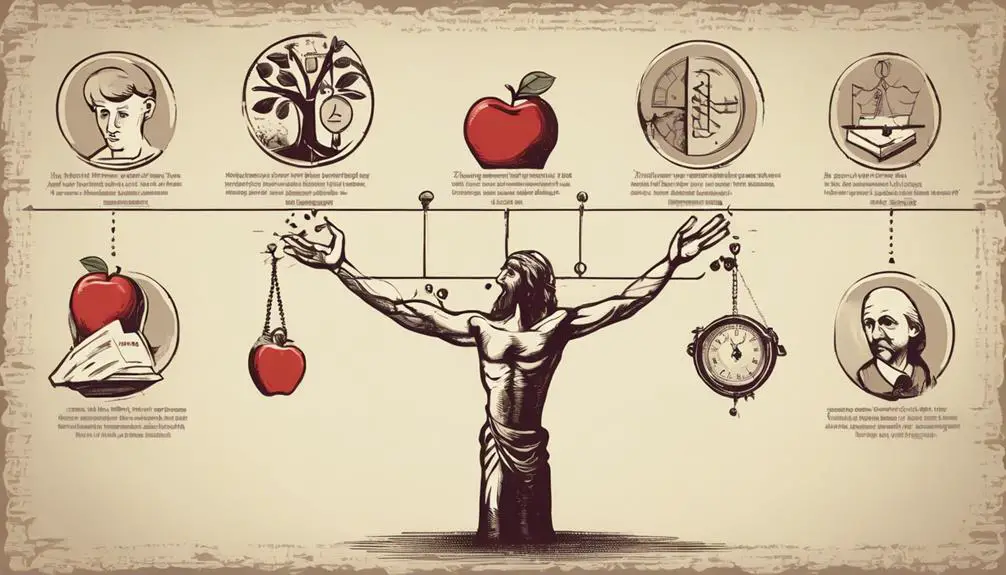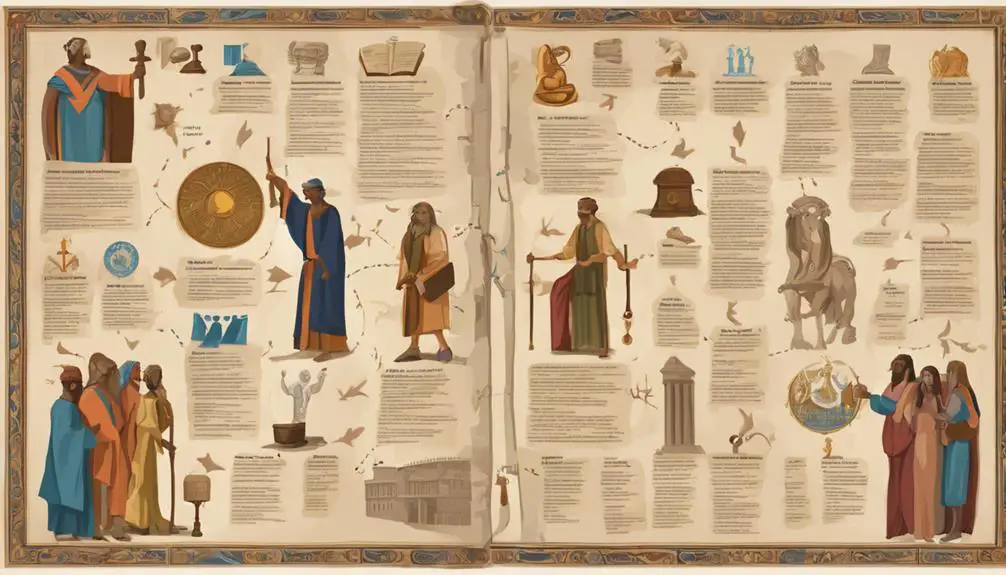Survey the seven dispensations in the Bible chart and uncover fresh insights into God's evolving relationship with humanity through the ages.

7 Dispensations in the Bible Chart
You might not be aware that the Bible is divided into seven dispensations or ages, each representing a distinct period of God's dealings with mankind.
These dispensations, charted out, can offer a unique perspective on Biblical events and God's evolving relationship with humanity.
Now, wouldn't you be intrigued to investigate further and comprehend what each of these dispensations signifies, and what lessons they might hold for us today?
Key Takeaways
- Understanding dispensations provides insight into the evolution of God's relationship with humanity across biblical history.
- Each dispensation represents a distinct era in the Bible, characterized by unique divine regulations and human responsibilities.
- Key dispensations include Ages of Innocence, Conscience, Human Government, Promise, Law, Grace (or Church Age), and Kingdom Theology.
- Analyzing these dispensations helps in comprehending the grand narrative of the Bible, particularly God's plan of salvation.
Understanding Dispensations in the Bible

To fully grasp the concept of dispensations in the Bible, you must delve into the heart of its theological implications, intricately examining each era's divine expectations and human responsibilities. This is where the concept of 'Dispensational Determinants' comes into play, serving as the bedrock for forming an accurate Biblical Timeline Interpretation.
In essence, dispensations are specific periods in the biblical timeline where God dispenses His will, expectations, and regulations differently. Think of them as separate chapters in God's grand narrative, each with its distinct divine-human contractual terms.
The key to accurately deciphering these dispensations lies in the careful analysis of scriptural nuances. This isn't about cherry-picking verses; it's about exploring the overarching themes, divine-human interactions, and covenantal shifts present within each dispensational period. By doing so, you'll start to see patterns and constants that transcend each dispensation, providing a holistic understanding of God's redemptive plan.
The Age of Innocence

As we embark on our journey through the various dispensations, the first stop is 'The Age of Innocence', a time period marked by pure human existence before the advent of sin. This era, symbolised by the Garden of Eden, is a testament to the original purity of mankind, untainted by the blemish of transgressions.
The 'Age of Innocence' is replete with innocence symbolism that underscores the following:
- The unadulterated relationship between God and man.
- The pristine nature of man's consciousness, free from guilt or sin.
- The harmonious co-existence of all God's creatures.
- The divine potential of man in his uncorrupted state.
- The tranquility and peace prevailing in the absence of sin.
The original purity of this era isn't mere absence of sin, but a state of unspoiled communion with God. The innocence symbolism doesn't merely denote naivety, but rather a profound understanding of God's love and His intention for His creation. As you delve deeper into this 'Age of Innocence', you'll appreciate the solemnity of its implications on mankind's spiritual journey and the profound loss that came with the advent of sin.
The Age of Conscience

In the aftermath of the Age of Innocence, we encounter the 'Age of Conscience', a pivotal period in biblical history where mankind's moral awareness and personal responsibility take center stage. During this epoch, you'll note that the 'Conscience Evolution' becomes more pronounced, as men and women start to grapple with the concept of right and wrong.
The Age of Conscience is marked by humanity's struggle to align their actions with their burgeoning moral compass, fostering an environment of 'Moral Responsibility'. This was a time when humanity was challenged to listen to their conscience, cultivate it, and act on its guidance.
To help you grasp the depth of this era, here's a brief outline:
Aspect |
Description |
Significance |
|---|---|---|
Conscience Evolution |
Awareness of right and wrong |
Marked the moral awakening of humanity |
Moral Responsibility |
Accountability for actions |
Instilled a sense of personal culpability |
Outcome |
Humanity's failure to heed their conscience |
Led to the judgment of the Great Flood |
This age may not have ended in success, but it played a crucial role in humanity's spiritual and moral growth, laying the groundwork for the ages to follow.
The Age of Human Government

Following the Age of Conscience, you'll encounter the 'Age of Human Government', a distinct epoch in biblical history that marks the establishment and evolution of human-led societal structures. This era is characterized by an intriguing blend of Governmental Evolution and Biblical Leadership. It's an era where humans were given the authority to govern themselves and their societies.
As you delve into this age, you'll be particularly drawn to the following aspects:
- The shift from divine to human leadership, marking the birth of political systems.
- The first instances of law enforcement and judicial systems, as humans upheld justice.
- The struggle for ethical governance amidst the rise of human autonomy.
- The formation of societal hierarchies, laying the groundwork for future civilizations.
- The Biblical narrative's depiction of the challenges and triumphs of early human leadership.
The Age of Human Government, thus, represents a pivotal period in biblical history. It's a time when human autonomy became intertwined with divine instruction, shaping society's trajectory. Understanding this age helps you appreciate the intricate balance between human will and divine guidance, a theme that resonates throughout the Bible.
The Age of Promise

Moving forward from the Age of Human Government, you'll encounter the next epoch in biblical history known as the Age of Promise, a period marked by divine covenants and the hope of redemption. This age was characterized by the assurance of Promise Fulfillment, where God's promises became the guideposts for faith.
Central to the Age of Promise was the Abrahamic Covenant, a Divine Covenant between God and Abraham. This covenant was the cornerstone of God's relationship with Abraham's descendants, setting the stage for the future of Israel.
The Age of Promise was not just about promises, but also about faith and obedience. The people were expected to respond in faith to God's promises, and their obedience was a testament to their trust in God's promises.
To better understand this age, let's look at the following table:
Covenant |
Promise |
Fulfillment |
|---|---|---|
Abrahamic Covenant |
Land, descendants, blessing |
Land promised is given, descendants become a great nation, blessing to all nations |
Noahic Covenant |
Never to destroy all life by flood |
Rainbow as sign of promise |
Davidic Covenant |
An everlasting kingdom |
Through Jesus Christ's eternal reign |
The Age of Promise was a profound period of faith, obedience, and divine fulfillment.
The Age of Law

As we delve into the next epoch, the Age of Law, you'll find it to be a distinct period in biblical history marked by divine commandments and the establishment of legal norms. During this era, the Mosaic Commandments came into existence, setting the course for Law Interpretations.
This period is characterized by:
- *The introduction of the Ten Commandments:* A divine code of ethics that shaped the moral compass of the Israelites.
- *The emergence of the Mosaic Law:* Detailed religious and social regulations that structured the community.
- *The institution of the Tabernacle worship:* A symbolic representation of God's presence among His people.
- *The implementation of the sacrificial system:* A means of atonement for sins, emphasizing the seriousness of transgressions.
- *The establishment of a Theocratic nation:* God ruled directly through Moses, demonstrating His sovereign power.
You'll discover the Age of Law wasn't merely about legalism but about understanding the heart of God. It was during this dispensation that God's inflexible holiness and man's inability to fulfill the law's demands became evident. This age prepared humanity for the coming Messiah who'd fulfill the law perfectly.
The Age of Grace and Kingdom

Shifting from the Age of Law, you're now entering the epoch of Grace and Kingdom, a period marked by divine forgiveness and the promise of eternal life. This shift presents a crucial turning point in biblical history.
The Age of Grace, also known as the Church Age, unveils Grace's manifestation through Jesus Christ's sacrifice. This sacrifice offers salvation freely to all who believe, thus establishing a new covenant of faith over works.
Kingdom theology, on the other hand, anticipates the return of Christ and the establishment of God's Kingdom on earth. This theology centers around the belief that believers are part of this Kingdom now, not just in the future.
To visualize these concepts, refer to the table below:
Age |
Characteristic |
|---|---|
Age of Grace |
Grace's manifestation through Jesus Christ's sacrifice |
Kingdom Age |
Theology anticipating Christ's return and Kingdom establishment |
Analyzing these epochs helps you appreciate the grand narrative of the Bible. It reveals how God's plan of salvation unfolds throughout history. As you move further into your exploration, you'll understand the beauty of God's grace and the hope instilled through Kingdom theology.
Frequently Asked Questions
How Did the Concept of Dispensations in the Bible Influence the Formation of Various Christian Denominations?
Dispensational impact significantly influenced the formation of various Christian denominations.
You'd find that these biblical epochs gave rise to differing interpretations of biblical texts, leading to the development of distinct doctrines.
This, in turn, resulted in the creation of diverse Christian branches.
They've shaped beliefs, practices, and worship styles, demonstrating the profound influence of dispensational concepts in shaping Christianity's landscape.
Are There Any Specific Symbols or Imagery Associated With Each Age in the Bible's Dispensations?
Yes, there's specific symbolism in each Biblical dispensation. Your Dispensational Imagery Analysis should focus on identifying these symbols.
For instance, the Age of Innocence is often depicted with a garden, symbolizing Eden. In the Age of Law, tablets are common, signifying the Ten Commandments.
Understanding this Biblical Symbolism Significance can deepen your interpretation of biblical texts and their messages. Each age carries its unique imagery, enriching the overall narrative.
Has the Interpretation of Biblical Dispensations Evolved Over Time Within the Theological Community?
Yes, the interpretation of biblical dispensations has indeed evolved over time within the theological community. Dispensationalism's impact on modern society reflects these shifts in understanding.
By examining the historical context of biblical dispensations, you'll see debates, reinterpretations, and new perspectives emerge. As societal norms and values change, so too does the interpretation of these biblical periods.
It's a dynamic, ongoing process that continues to shape theological discourse.
Can Dispensationalism in the Bible Be Linked to Any Other Religious Doctrines Outside Christianity?
Dispensationalism, primarily a Christian concept, may have indirect links to some aspects of other religions. For instance, in Islam, there's a belief in different prophetic eras, somewhat parallel to dispensational periods.
Similarly, in Judaism, different covenants could be interpreted as dispensational shifts. However, these links aren't explicit and the concept of dispensationalism as defined within Christianity doesn't directly translate to these faiths.
What Are the Most Common Misconceptions or Controversies Surrounding the Understanding of Dispensations in the Bible?
One common misconception about dispensations in the Bible is that they're rigid, distinct periods. This isn't accurate; they often overlap and evolve.
Controversies often stem from how dispensationalism impacts society and its apparent conflict with scientific understandings. You may encounter claims that it promotes elitism or fatalism, but it's crucial to remember that interpretation varies widely among believers.
Conclusion
In sum, understanding the seven dispensations in the Bible helps you grasp the unfolding narrative of God's relationship with mankind.
From the innocence of Eden, through conscience, human governance, promise, law, and finally grace and kingdom, each age reveals God's enduring mercy and sovereignty.
By studying these eras, you gain a deeper appreciation of God's master plan and your own role within it.
Keep exploring this chart to deepen your biblical knowledge and spiritual growth.



Sign up